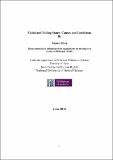| dc.description.abstract | Through scholarly consideration this study evaluates structural competency gaps that precipitate state failure and examines the resulting consequences for the world community. As an elected official for over seventeen years, including service as a Member of Parliament, I have travelled to many of the regions reviewed in this study. I have heard firsthand accounts from witnesses of the consequences of state failure in countries including Afghanistan, Sudan, Democratic Republic of the Congo and Haiti. Failing states have overlapping characteristics of structural competency failure, including the inability to provide healthcare, education, food, legitimate policing and economic sustainability. There are economic inequalities present as well as a loss of legitimacy, corruption and reduced social cohesion. Failure of rule of law is manifested in areas of judicial adjudication, security, reduced territorial control and systemic political instability. The international community often confronts these challenges in a manner that actually complicates issues further through lack of consensus among actors. Consequently, a new and emerging concept of sovereignty needs to be reviewed in terms of the post-modern state. The new and emerging human security compact, evolving globalization and the decline of the state redefine it within the new global order. In some instances the best interests of these failing and failed states would be best served by shared sovereignty with the international community; that is, trusteeship. International actors attempting to 'fix' failed states must focus their attention on the issues affecting structural competency that have actually caused the state to fail in the first place. By addressing the structural competency of failed states with an understanding of the causes, it is possible to create the practical framework for a global model of statehood that prevents state failure. Effective policies of integrated state-building and resources targeted at bridging structural competency gaps require a better understanding of both the challenges and the solutions. | en_US |


